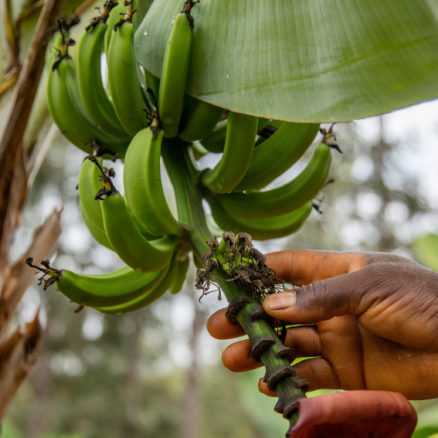
‘I will be ending poverty’: Jamleck, a farmer transforming Kenya
Jamleck Laska Arume is hoping he holds the solution for the droughts that have affected millions of Kenyans.
A 28-year-old farmer whose family owns seven acres of land in Embu County, Jamleck has planted banana trees that agronomists believe will be less susceptible to climate shocks.
It’s an especially exciting proposition because the drought wiped out nearly his entire maize harvest last year. Now part of Hand in Hand’s push to help more than 40,000 farmers stand up to climate change, Jamleck had to shoulder the additional expense of pumping water to the farm.
Even then, he was left with barely enough maize, notoriously vulnerable to climate variability, to provide for his own family.
“We didn’t have anything,” he said. “Like, specifically, we used maize for what we use in the house. These bananas, we are using them as a business. We can use them to earn money.”
Embu County, Kenya
New crops, new future
Kenya’s National Drought Management Agency now believes that droughts will distress the region every five or so years. More than three quarters of the country has been affected by the most recent devastation, and even those counties that have recovered are still experiencing severe vegetation deficit. Livestock, and not just crops, has also been lost.
An estimated 14 million people in Kenya can’t meet daily food requirements, according to research from Kenya’s Egerton University, and 4 million couldn’t even meet their daily calorific requirements if they spent their entire incomes on food. Almost all of these people are rural.
Bananas are one of the most prevalent crops grown throughout Kenya, but, like maize, they’re also highly susceptible to diseases and moderate changes in climate. By adopting techniques and farming what are known as tissue culture bananas, which are more resistant, can produce higher yields and grow much faster, they can help mitigate drought-stricken areas like Embu County.
That’s why Jamleck has volunteered to plant them. Not only is his family’s farm large enough, he has never grown bananas — an important characteristic to making sure the tissue culture bananas thrive because the land will not have been previously affected by disease.
Hand in Hand, with the support of the IKEA Foundation, will continue to help Jamleck with growing the bananas on his “demo farm,” providing him with the tools and instruction he needs to make sure they succeed. Once they’re ready, he and others in the community will be brought together to negotiate with wholesalers to distribute the bananas around the country.
All told, Jamleck will be one of more than 43,000 smallholder farmers who will have increased their incomes while helping thousands of communities address issues they face directly as the result of climate change.

“I feel it’s just what I need,” Jamleck said. “What I have been learning in the community will be ending poverty, so what I need is to help others so they can also learn from me.”
A bright future
Jamleck’s interactions with Hand in Hand haven’t been limited to planting bananas. He has also learned a lot about the fundamentals of running a business, including the process of learning how to manage profit, and has begun to recognise there are ways he can increase his margins.
“They didn’t tell us they would give us anything, but they showed us,” he said. “They want to make us stand by ourselves. They want us to be able to do more things by ourselves so we can produce and we can accomplish more things.”
Thus far, Jamleck has been able to purchase his own water pump to help irrigate his crops, and he wants to buy additional cows to better fertilise the farm. His next step will be to hire people who can help him with the farm, not only to plant and harvest the crops but also to take the coffee beans to be sold and processed at local factories.
And, because he regrets that his parents were not able to pay for him to have a proper education, his ultimate goal is to make enough money to be able to do so for his 2-year-old daughter, Blessings.
Should the banana crop succeed, Jamleck will not only have provided her with a future but will have done so for countless of people across Kenya as well.
Planted resistant banana crop to mitigate drought effects
Purchased water pump with profit from existing maize and coffee crops
Developing plans to continue expanding business
Next case study: Meet Gloria, the former refugee growing crops – and profits
